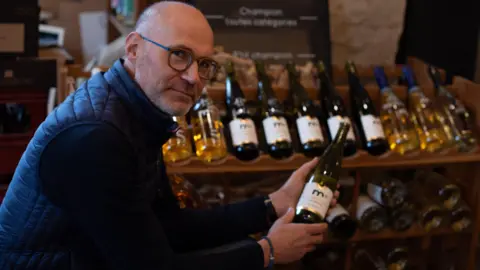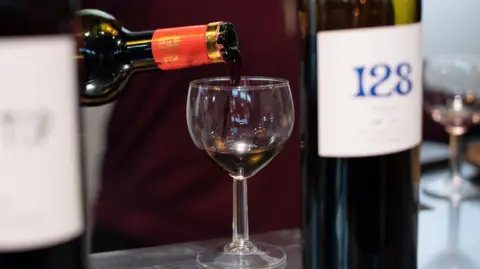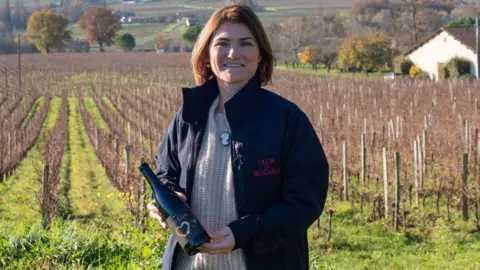 BBC
BBCIn the vineyards of Bordeaux, the unspeakable has become drinkable. Non-alcoholic wine has arrived.
Yesterday’s heresy is today’s opportunity – thanks to science and the economic crisis.
Wineries that would have preferred to burn their grapes rather than subject themselves to such ignominy are now openly considering the non-alcoholic bottle.
And developers are moving quickly, creating wines that are consciously designed to make the most of the dealcoholization process.
“When we started a few years ago, what we were doing was, frankly, nonsense,” says Bordeaux oenologist Frédéric Brochet, who helped develop the Moderato range of non-alcoholic wines.
“But we have made great progress. And today we are getting closer and closer to our goal. I think it will be a revolution in the wine world.”
Bordeaux has just seen the launch of its very first company cave – Wine shop – specializing exclusively in non-alcoholic wines, reflecting a shift in perception that has surprised many in the industry.
“We only opened four weeks ago and already local winemakers are coming and asking about the soft drinks market,” says Alexandre Kettaneh, who owns Les Belles Grappes with his wife Anne.
“They don’t know how to do it, but they see it coming and want to be a part of it.”
Several things have happened that make this moment seem opportune.
Firstly, the French wine world is in big trouble. Domestic consumption continues to decline and the Chinese market is no longer what it once was. The elected US President Donald Trump is threatening new taxes. Valuable old vineyards are being cleared across France.
Secondly, consumption habits are changing, especially among young people. Supermarkets now give more space to beer than to wine. Most 20-somethings have never had the habit of drinking wine – and they’re also far more health-conscious than their elders.
The alcohol-free lifestyle is spreading. Currently 10% of the French beer market is non-alcoholic. In Spain it is 25%.
And third – technology has improved by leaps and bounds.

In the past – and even today with cheaper brands – the method was simply to boil away the alcohol and then add balancing flavors. The result is mediocre at best, especially for the red tones. Such drinks cannot even be called wine, but rather “drinks based on dealcoholized wine”.
However, now there are new methods of low-temperature vacuum distillation and “capturing” flavors to reintroduce them into the dealcoholized wine. The result is wines that can legally be called wines and are beginning to assert themselves among discerning consumers.
“With red wines you have to be prepared for an experience that cannot be compared to a traditional wine with alcohol. We cannot claim that we can reproduce the full mouthfeel,” says Fabien Marchand-Cassagne from Moderato.
“But what you’re going to get is a real crying moment. Bouquet, tannins, fruits, balance – everything is there to be enjoyed.”
At the Clos De Bouard winery near Saint-Emilion, a good third of sales now come from the castle’s two – soon to be three – non-alcoholic brands. Owner Coralie de Bouard first saw the possibilities when she was asked in 2019 to develop a non-alcoholic wine for the Qatari owners of PSG football club.

“My family didn’t want to talk to me for a year, that was my ‘betrayal’. And to this day I still get hate mail from winemakers saying I’m ruining the market,” she says.
“But now my father congratulates me and says I’m the locomotive on the wine train. And if we survive today in these difficult times, it is because we have turned to the soft drinks market.”
“It was very difficult for the purists to accept this,” says Bernard Rabouy, winemaker at the Bordeaux Families cooperative.
“But we have to develop further. The fact is that customers are no longer where they once were. So we have to get them, otherwise they will go somewhere else.”
Proponents of non-alcoholic wine primarily promote the idea that it will allow non-drinkers – who previously felt excluded – to take part in the wine banter. And in fact, the rituals of opening, sniffing, describing and comparing are now open to everyone.
“We want to try to bring back the France of our youth – when everyone sat at the dinner table and drank wine and it was a real moment of sharing,” says Anne Kattaneh.
“And today we will only succeed if non-alcoholic wines are part of the culture.”
“The idea that the wine world has always been the way it is now is nonsense,” says oenologist Brochet.
“Things are evolving. The barrel was once an innovation. The cork was an innovation; the grape varieties were an innovation. And now this is a new one – one that could help save the industry and the wonderful landscape and culture that comes with it.” .
“As (poet) Paul Valery said: What is tradition but a successful innovation?”






